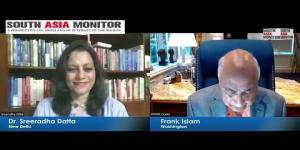With over three dozen positions to fill, Nepal PM Oli, former PM Deuba want to share spoils
Amid the delay in appointments to several constitutional commissions, Prime Minister KP Sharma Oli and Nepali Congress President Sher Bahadur Deuba have intensified negotiations on the sharing of over three dozen positions, which, according to experts, is an assault on the spirit of the constitution

Amid the delay in appointments to several constitutional commissions, Prime Minister KP Sharma Oli and Nepali Congress President Sher Bahadur Deuba have intensified negotiations on the sharing of over three dozen positions, which, according to experts, is an assault on the spirit of the constitution.
The two leaders met on Thursday and Friday and are scheduled to meet again on Sunday to finalise the sharing deal. Oli will be calling a meeting of the Constitutional Council once he reaches a consensus with the leader of the opposition, a member of the commission.
Senior Advocate Bhimarjun Acharya, who specialises on constitutional law, said that the act of Oli and Deuba is condemnable. “Those handpicked by Oli and Deuba can never be loyal to the institution, they will be loyal to them instead,” he told the Post. “Such appointees might have their legal authority but won’t have moral authority to act independently.”
Subas Nembang, deputy parliamentary party leader of the Nepal Communist Party (NCP), who was present in Friday’s meeting, said Oli and Deuba could agree on the appointments in 13 constitutional commissions. Forty constitutional positions remain to be filled in those commissions.
“Prime Minister Oli, after an agreement with Deuba, will call a meeting of the council, most probably within three to four days,” he told the Post.
According to party sources, the ongoing negotiations are focused on the appointments to the Commission for Investigation on Abuse of Authority, the anti-corruption watchdog which is being legally strengthened, and the Election Commission. Each has two positions vacant.
The Nepali Congress wants its say in the recommendation of one position each in the corruption watchdog and the Election Commission. It wants former additional inspector general of Nepal Police Jaya Bahadur Chand to be recommended for a position while the ruling party’s probable pick is former home secretary Prem Kumar Rai, according to party sources.
The seven-member council headed by the prime minister recommends the names for the constitutional commissions to be appointed after getting through parliamentary hearing.
The constitution envisages the inclusion of the leader of the opposition to vet the names the prime minister proposes, according to constitutional expert Bipin Adhikari, former dean at Kathmandu University School of Law, since the members in the council are close to the ruling party.
“But if there is a deal between Oli and Deuba, other members will not dare challenge it,’’ he said.
Oli and Deuba had a one on one meeting on Thursday but Nembang and Ramesh Lekhak from the Nepali Congress joined them in Friday's meeting. They will be present at Sunday's meeting when the two parties are expected to finalise the deal.
Congress leaders say as Oli monopolised the appointments in the past, they don’t want a repeat of that.
“Appointments to constitutional bodies are not Oli’s prerogative. The opposition should be taken in for consensus,” he told the Post.
Constitutional experts say the present negotiations between the two parties will turn the constitutional council into a rubber stamp, which is a direct violation of the Constitution of Nepal.
“The degradation in the appointment process in the constitutional bodies that started in the 1990's has further deteriorated with the latest negotiation,” Adhikari told the Post. “We cannot expect capable and qualified people to get appointed when the prime minister and the leader of the opposition hold the Constitutional Council hostage.”
Appointment of controversial figures like Gopal Parajuli, who lied about his date of birth, and Cholendra Sumsher Rana, whose impeachment is being demanded after a controversial verdict last month, as the chief justice and Lokman Singh Karki as the chief of the anti-graft commission, who was removed ignominiously, suggests how politicised the appointment process is in the constitutional bodies, he said.
Besides the anti-corruption body and the Election Commission, six inclusion commissions too are vacant.
While four commissions—Madhesi, Dalit, Tharu and Muslim—have chairpersons but no members, two others—Women and Indigenous Nationalities—don’t even have chairpersons. The Inclusion Commission had a chairperson until July 28 last year, when Shanta Raj Subedi resigned from the post. Each has five members including the chairperson.
The last time the council met was on March 25 last year, when Dinesh Thapaliya was recommended as the chief commissioner of the Election Commission and Bishnu Maya Ojha as a member of the Inclusion Commission.
The council had been called to meet on October 22 and again on November 13 last year but the sittings were deferred both times as Deuba failed to show up. The council on January 20, 2019 had picked the chairperson for the Madhesi, Dalit, Tharu and Muslim commissions despite the reservations of the main opposition.
The primary opposition, as a protest against the recommendation, had boycotted the parliamentary hearing process. But since the ruling party had a majority in the hearing committee, the council’s picks were endorsed.
https://kathmandupost.com/national/2020/07/26/with-over-three-dozen-positions-to-fill-oli-deuba-want-to-share-spoils
















Post a Comment